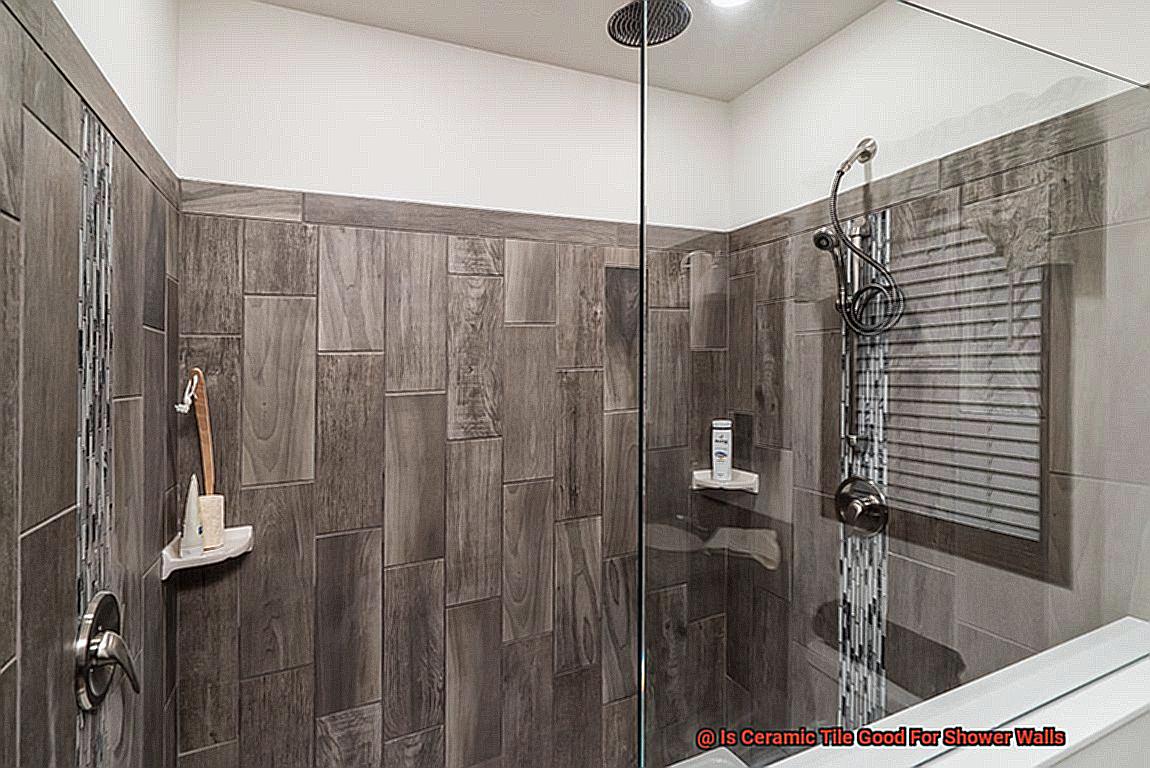Are you looking to give your bathroom a fresh new look? Are you wondering whether ceramic tiles are the right choice for your shower walls? In this post, we’ll explore the pros and cons of using ceramic tiles for your shower walls.
Ceramic tiles are a popular option for shower walls due to their durability and resistance to moisture. Not only that, but they come in an array of colors, patterns, and textures to suit any bathroom style. However, it’s essential to keep in mind that ceramic tiles require regular maintenance, such as sealing and grouting, to prevent mold and mildew growth.
When choosing ceramic tiles for your shower walls, there are several factors to consider. The size and layout of the tiles can have a significant impact on the overall appearance of your shower. Additionally, selecting the right grout color is crucial as it can either enhance or detract from the beauty of your tile. Lastly, ensuring that your substrate has proper waterproofing and slope is essential for preventing water damage.
If you’re still unsure whether ceramic tiles are the right fit for your needs, don’t worry. We’ve got you covered with all the information you need to make an informed decision.
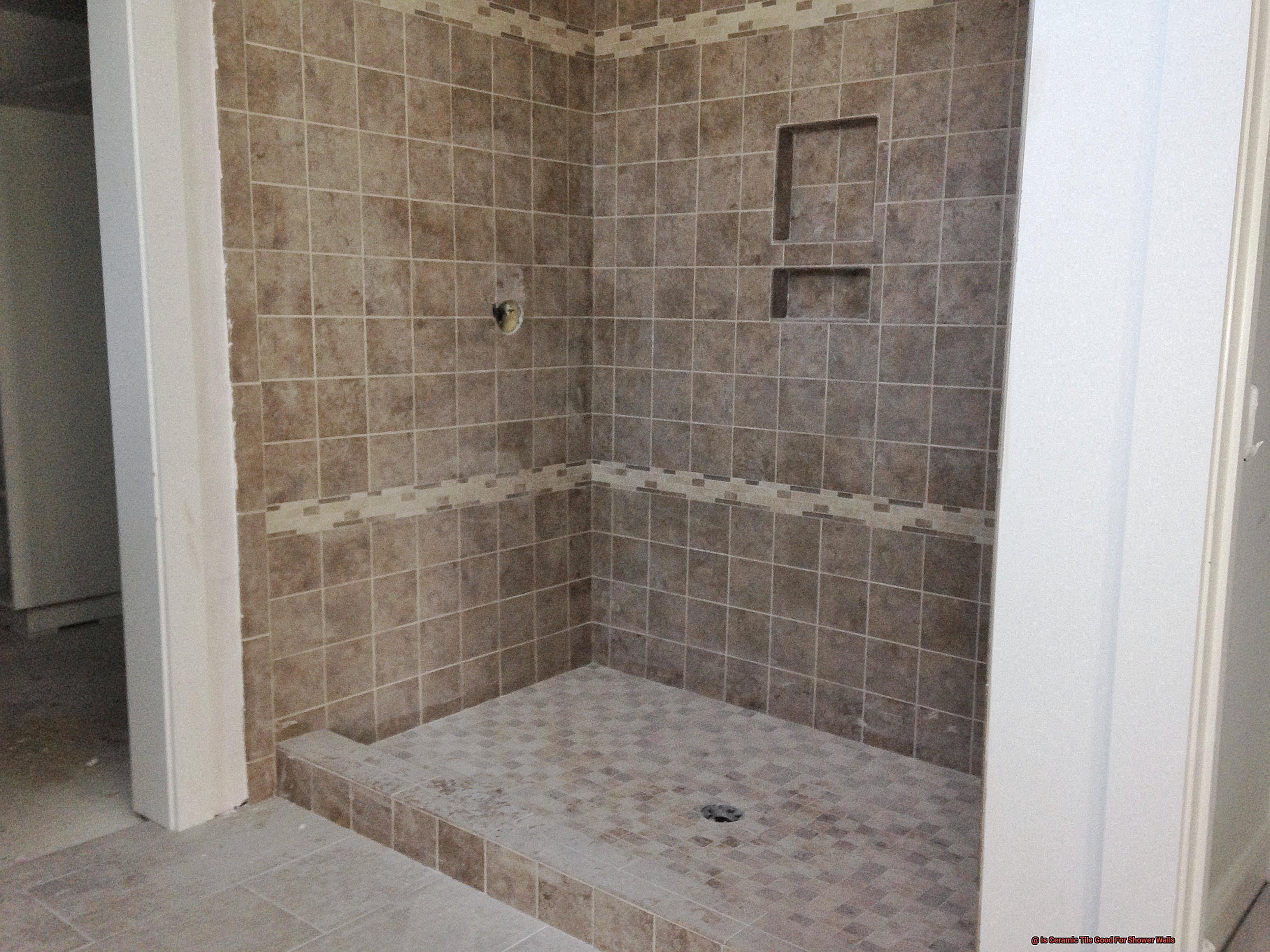
So, keep reading to discover if ceramic tiles are good for your shower walls.
Contents
Benefits of Ceramic Tile for Shower Walls
If you’re looking for a practical and stylish material for your shower walls, ceramic tile is an excellent choice. As an expert in bathroom design, I’ve seen firsthand the many benefits that ceramic tile offers.
First, ceramic tile is incredibly durable. It can withstand constant exposure to moisture and humidity without deteriorating or warping over time. This makes it perfect for shower walls, where water is a constant presence. Additionally, ceramic tile is resistant to stains and scratches, meaning it will continue looking great even after years of use.
But durability isn’t the only advantage of ceramic tile. It’s also an incredibly versatile material in terms of design options. You can choose from a wide range of colors, patterns, and textures to create a personalized look that perfectly matches your style preferences. Whether you want classic white subway tiles or a bold mosaic pattern, ceramic tile can deliver the design flexibility you crave.
Maintenance is another area where ceramic tile excels. Unlike other materials that require special cleaning products or techniques, ceramic tile can be easily cleaned with just soap and water. This makes it an ideal choice for busy homeowners who don’t want to spend hours maintaining their bathroom walls.
Ceramic tile is one of the most affordable materials you can choose for shower walls. Yet despite its lower price point, it still delivers a high-end look that can rival more expensive options like natural stone or glass.
Drawbacks of Ceramic Tile for Shower Walls
Ceramic tiles are a go-to option for shower walls, thanks to their sturdy build and resistance to water. However, before you make up your mind, it’s important to consider the potential drawbacks.
One of the biggest downsides of ceramic tiles is their tendency to foster mold and mildew growth. The grout lines can trap moisture, leading to the growth of these unwelcome guests. What’s more, the spores can pose health risks for those with allergies or respiratory issues. To keep your shower clean and safe, regular cleaning is essential.
Another issue with ceramic tiles is their slipperiness when wet, making them a safety hazard for young children and elderly individuals. To avoid accidents, it’s best to choose textured tiles or add non-slip mats that provide better traction in the shower.
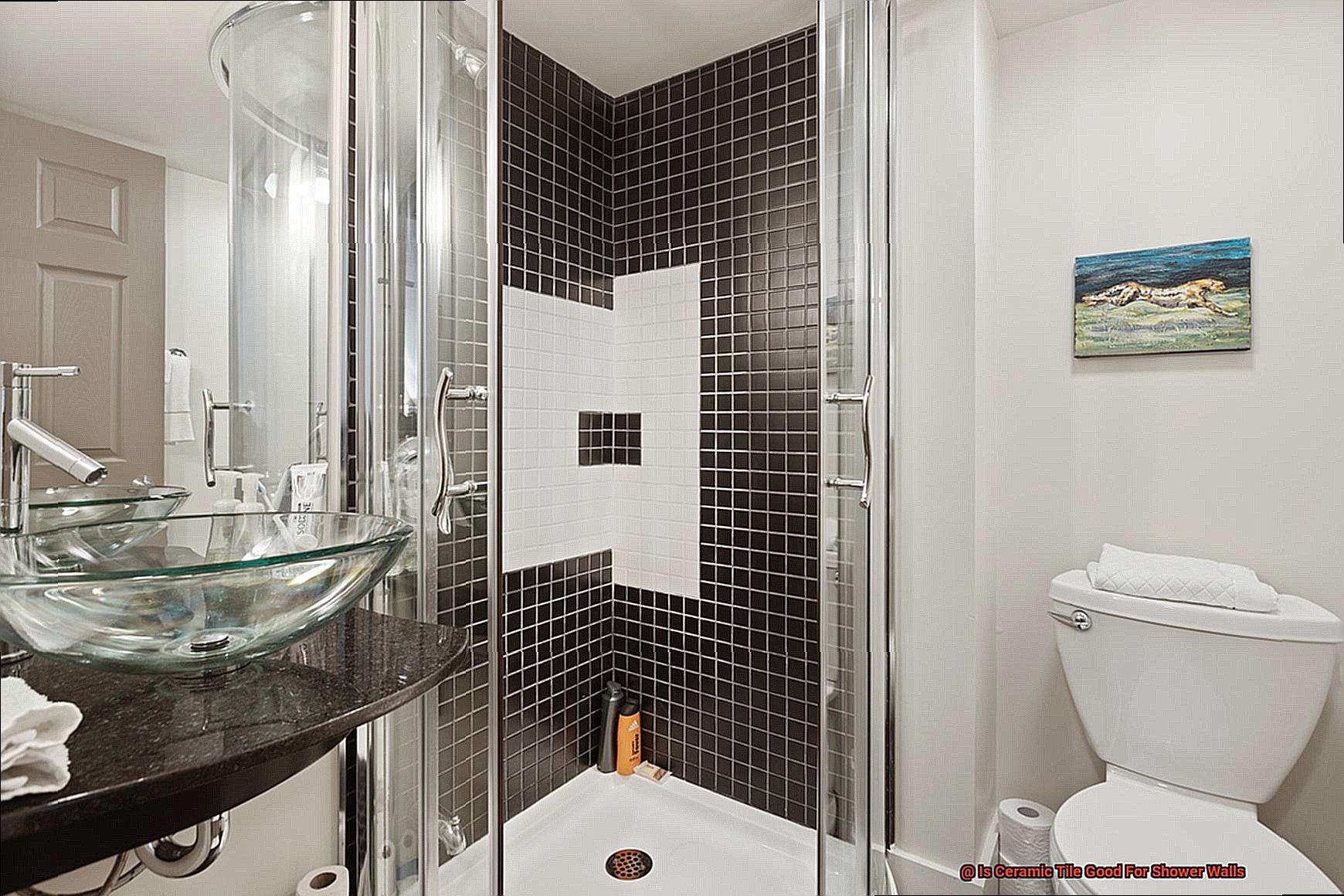
Ceramic tiles are also prone to cracking or chipping if subjected to heavy impacts or if they’re not installed correctly. This can result in costly repairs or replacements that can be frustrating and inconvenient.
Furthermore, ceramic tile installation is both time-consuming and expensive. It requires skilled labor and specialized tools, which can significantly add up in cost. Homeowners must factor in their budget and timeline before committing to a ceramic tile shower wall installation.
Despite these potential drawbacks, ceramic tiles remain a popular choice for many homeowners due to their durability, water resistance, and endless design options. It’s crucial to weigh the benefits against the drawbacks before making your decision.
How to Choose the Right Ceramic Tile for Your Shower Walls
Choosing the right ceramic tile for your shower walls is a crucial decision that can make or break the overall look and feel of your bathroom. Here are five essential factors to keep in mind when selecting the perfect ceramic tile for your shower walls.
Waterproof, durable, and easy to clean
Your shower walls are exposed to moisture and water on a daily basis, so it’s crucial to choose a ceramic tile that is waterproof, durable, and easy to clean.
A high-quality ceramic tile will ensure that your shower walls remain damage-free and beautiful for years to come.
Size and shape matter
The size and shape of the tiles you choose can significantly impact the overall look and feel of your shower. Large tiles can create an illusion of space, making a small shower appear larger.
Meanwhile, smaller tiles can create intricate designs that add visual interest to your walls. However, smaller tiles require more grout, which means more maintenance.
Texture and finish
The texture and finish of your ceramic tiles are equally important when choosing the right one for your shower walls. A glossy finish can give your shower walls a sleek, polished look, while a matte finish can add depth and texture. Textured tiles can provide more grip, ensuring that you don’t slip while taking a shower.
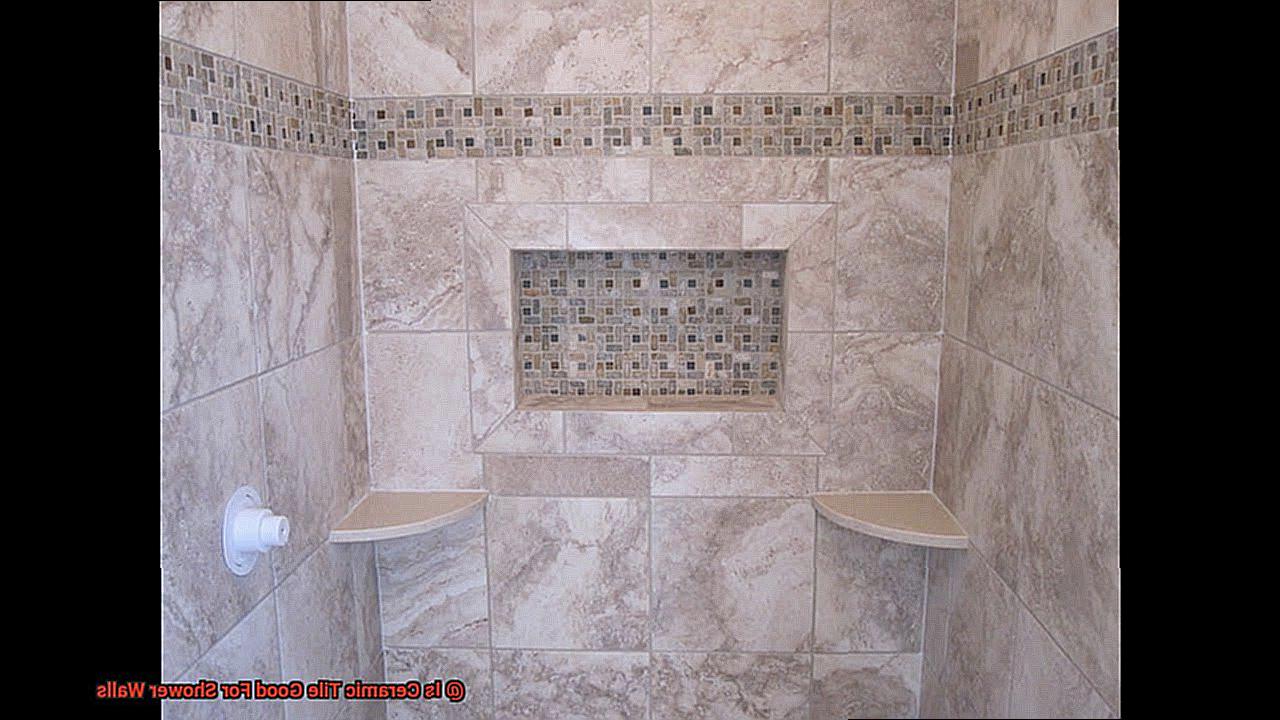
Color and pattern
The color and pattern of the ceramic tile you choose can make or break the overall look of your bathroom. Lighter colors can make a small shower appear larger, while darker colors can create a cozy ambiance. Patterns can add interest and depth to your shower walls, but be careful not to choose one that’s too busy.
Complementing overall bathroom style
When choosing the right ceramic tile for your shower walls, it’s essential to consider the overall style of your bathroom. Whether you prefer a modern or traditional design, there is a ceramic tile out there that will suit your needs.
Choosing a tile that complements the overall style of your bathroom will tie everything together, creating a cohesive and beautiful space.
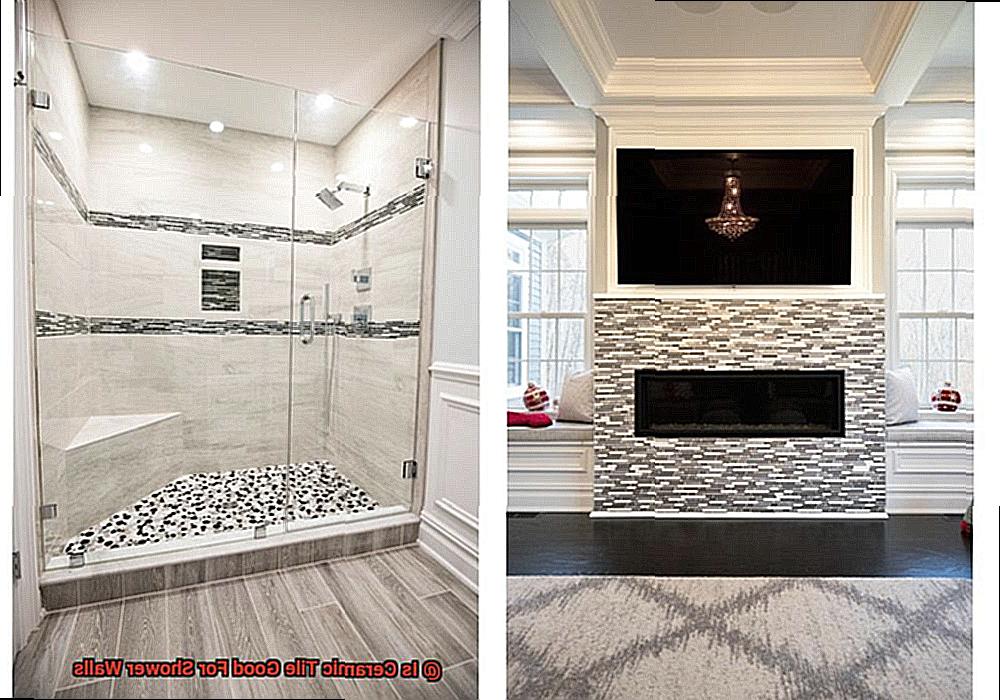
By keeping these five factors in mind, you’ll be able to select the perfect ceramic tile for your shower walls, creating a functional and beautiful space that you’ll love for years to come.
Maintenance and Cleaning Tips for Ceramic Tiles in Showers
If so, it’s essential to maintain and clean them regularly. As a ceramic tile expert, I’ve compiled some tips on how to keep your shower walls in pristine condition.
Regular Cleaning
Keeping your ceramic tiles clean is the first step to maintaining their beauty. However, harsh chemicals and abrasive scrubbers can damage the tile surface. Instead, use a non-abrasive cleaner specifically designed for ceramic tiles.
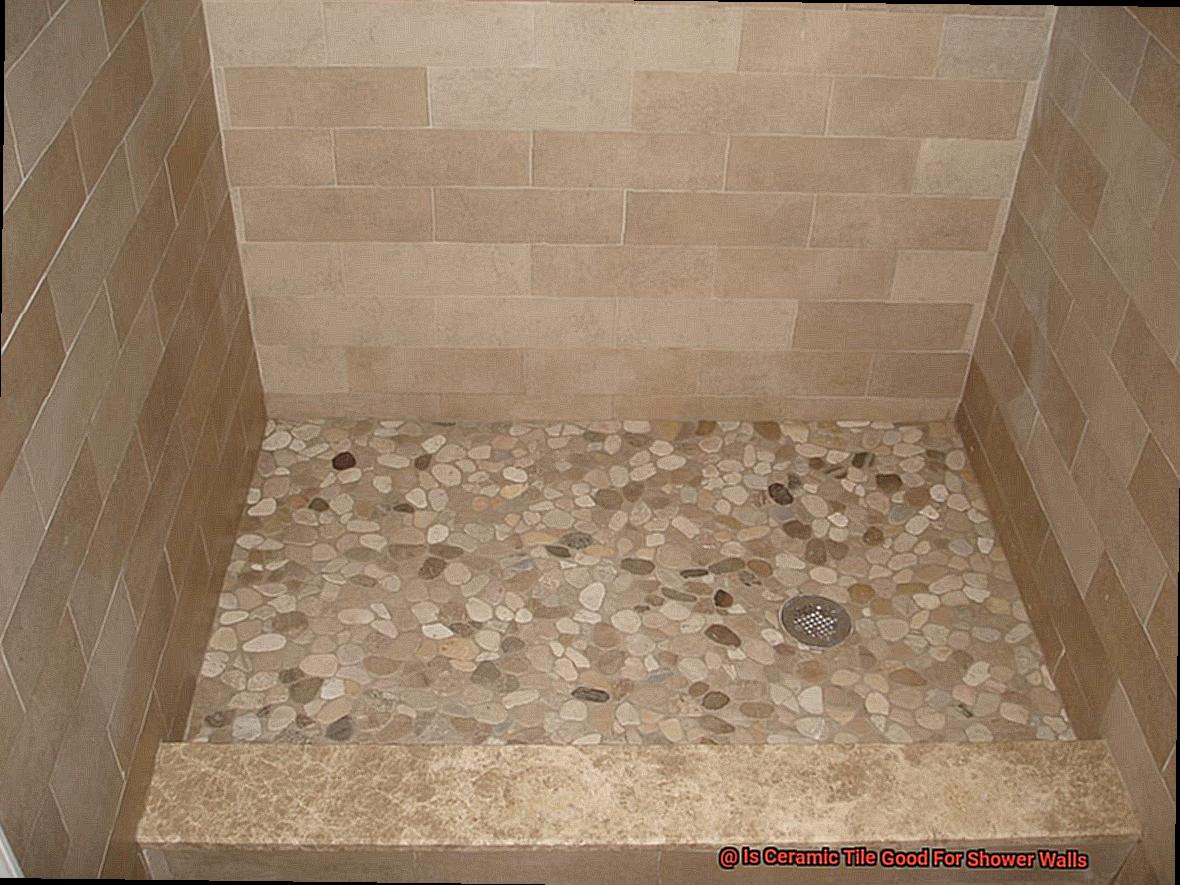
Wipe down the tiles after each use with a squeegee or towel to remove excess water and soap scum. Regular cleaning prevents buildup from occurring and helps maintain the tiles’ lustrous appearance.
Sealing
Ceramic tiles are porous and can absorb water, leading to mold growth and other problems. Sealing your tiles creates a protective layer that repels water and keeps them looking new for longer. Most ceramic tiles come pre-sealed, but this sealant can wear away over time. Reseal your tiles at least once a year using a paintbrush or roller to apply the sealant.
Grout Maintenance
The grout between your tiles is susceptible to discoloration and damage due to moisture and mold growth. Regularly clean the grout with a mild cleaner or baking soda and water solution to keep it looking clean and fresh.
If the grout is damaged, re-grout promptly to prevent water from seeping behind the surface and causing further problems.
Ventilation
Proper ventilation is crucial in preventing moisture buildup in your shower area. Make sure your bathroom has adequate ventilation, such as a fan or window, to allow for air circulation, prevent mold growth, and keep your shower walls dry.
Addressing Damage
Finally, if you notice any cracks or damage to your ceramic tiles, address these issues promptly. Cracks or chips in the tile can allow water to seep behind the surface, leading to mold growth and other problems.
Don’t try to repair the damage yourself if you’re not comfortable. Hire a professional to do the job for you.
Alternatives to Ceramic Tiles for Shower Walls
First up, we have natural stone, such as marble or granite. These materials are known for their elegance and luxury, and can add a high-end look to any bathroom. They are also durable and resistant to water damage, making them a great choice for shower walls.
If you’re after a modern and sleek look, glass panels might be the perfect option for you. They’re not only easy to clean and maintain, but they also allow more light to enter the shower space, creating a brighter and more open feeling.
For those who love DIY projects, acrylic panels are a fantastic choice. They’re lightweight and easy to install, and come in a variety of colors and patterns that allow for more customization in bathroom design.
Finally, waterproof wall panels made from PVC or composite materials are incredibly durable and resistant to water damage, making them ideal for use in showers. They’re also easy to install and maintain, making them an excellent option for those who want a low-maintenance bathroom.
While ceramic tiles remain popular, it’s important to consider factors like durability, maintenance, and design when choosing a material for shower walls.
Whether it’s natural stone, glass panels, acrylic panels, or waterproof wall panels made from PVC or composite materials, there’s an alternative out there that can help you achieve your dream bathroom.
rKDd8uI8Zns” >
Conclusion
In conclusion, ceramic tiles are a fantastic choice for shower walls. They offer durability, resistance to moisture, and endless design options that can transform your bathroom into a stylish sanctuary. However, it’s important to be aware of potential drawbacks such as mold growth and slipperiness when wet. Regular maintenance is also necessary to keep your ceramic tile shower walls looking their best.
When choosing ceramic tiles for your shower walls, several factors must be considered. These include the size and layout of the tiles, grout color, substrate waterproofing, and slope. By taking these factors into account, you can ensure that your shower is both beautiful and functional.
To maintain the pristine condition of your ceramic tile shower walls over time, regular cleaning, sealing, grout maintenance, ventilation and addressing any damage promptly is crucial.
While ceramic tiles remain popular among homeowners for their affordability and high-end look, there are alternatives such as natural stone or glass panels that offer different benefits.

